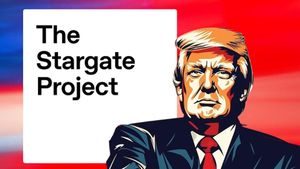President Donald Trump took significant steps toward establishing a U.S. sovereign wealth fund on Monday, after signing an executive order aimed at creating this government-owned investment vehicle. During the signing ceremony, which took place in the Oval Office, Trump indicated the fund could potentially include stakes from social media giant TikTok.
"I think it’s about time this country had a sovereign wealth fund," Trump declared, asserting his conviction the U.S. could eventually host one of the largest funds of its kind globally.
The initiative to create the fund is part of Trump’s strategy to profit from TikTok, which is owned by China-based ByteDance. The president hinted at the prospect of the U.S. taking about 50% ownership of TikTok if the deal goes through. "We might put TikTok in the sovereign wealth fund, whatever we make or we do, alongside partnership with very wealthy people," Trump said.
The executive order directs both the Treasury and Commerce departments to begin laying the groundwork for the fund, which would likely require Congressional approval—a challenge due to potential pushback from lawmakers concerned about losing control over federal spending streams. Treasury Secretary Scott Bessent stated their intention to have the fund operational within the coming 12 months.
While the specifics of funding the sovereign wealth fund remain unclear, critics point out the U.S. has not enjoyed a budget surplus since 2001, complicatively raising questions about uncertain funding mechanisms. Investment vehicles of this nature typically capitalize on budget surpluses or trade surpluses to operate effectively.
Sovereign wealth funds are prevalent globally, with the most notable examples located in oil-rich countries such as Norway, which boasts the largest fund valued at approximately $1.7 trillion, providing significant capital for government budgeting. The U.S. currently has state-level sovereign wealth funds, though none operate at the federal level.
Trump has previously pushed the narrative against TikTok, instructing his administration to implement measures to curb its influence over national security. A law mandatorily requiring ByteDance to sell TikTok or face national prohibition took effect on January 19, coinciding with Trump's inauguration. Following this, Trump issued separate executive orders, temporarily delaying the enforcement of this ban. Experts have indicated the legitimacy and feasibility of these actions may be legally dubious.
At the signing, Trump reflected on the sovereign wealth fund's potential, implying it could not only cater to TikTok but also involve future investments across various sectors. Trump stated, "We could put many other things in the fund." The excitement surrounding creating the fund came amid his administration’s awareness of the benefits such undertakings might provide for Americans.
Commerce Secretary Howard Lutnick echoed this sentiment by mentioning the potential use of the fund to take equity stakes, possibly within the pharmaceutical industry—as the administration aims to procure COVID-19 vaccines. He remarked, "The extraordinary size and scale of the U.S. government should create value for American citizens. If we are going to buy 2 billion COVID vaccines, maybe we should have some warrants and some equity in these companies and have it grow for the help of American people."
Observers have noted the difficulty Trump’s administration might face, particularly as Congress historically guards its role in budgetary allocations. There is apprehension about creating political accountability and transparency surrounding the fund’s management. Without strict governance measures, experts warn sovereign wealth funds can emerge as channels for corruption and misuse of funds.
Support for the establishment of such funds previously surfaced during President Joe Biden’s administration, which explored creating one focused on investments relating to national security. Nonetheless, concrete plans never materialized before he departed from office, illustrating the complexity and contentiousness of implementing such financial mechanisms.
The proposal has attracted considerable attention, not only because of its financial dimensions but also due to the intertwining issues of national security, digital governance, and international business dynamics. The world watches closely as any movement pivotal to TikTok could have ripple effects on the broader tech industry, especially amid rising tensions between the U.S. and China over technology and data privacy.
Overall, Trump’s actions outline not just aspirations to bolster fiscal strength through administration-led wealth generation opportunities but also highlight the many layers of political, social, and economic ramifications involved. The future of the U.S. sovereign wealth fund will certainly depend on both political will and public sentiment.



